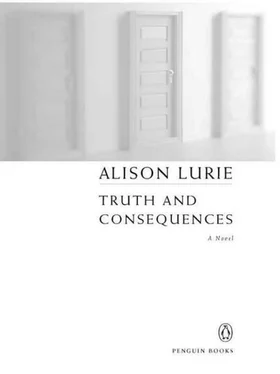Meanwhile, he was falling apart both physically and professionally. Because he was no longer able to play tennis or squash or swim or go to the gym, he had gained weight and lost muscle tone. And because it was agonizing for him to sit in a chair for more than five minutes, he had been unable to work on his book—and in any case, he hadn’t visited and photographed more than half the buildings he wanted to include. In his current depressed condition, he felt revulsion from the book, because even if it were completed and published, so few would know or care. Most people now had no interest in the architecture of the past: they liked or at least were used to the featureless or pretentious modern buildings, slabs and rectangles of plaster and glass and metal, that were everywhere now. Alan had grown up among constructions like that in California. But when he was twelve his father, a professor of engineering, had taken the family on a summer vacation to New England. The houses and churches and public buildings he saw there, with their classical beauty, simplicity, order, and harmony of design, had been a revelation to Alan—had in the end determined his life’s work.
His love of Colonial architecture had even played a part in his marriage. When he met Jane, it was not only her good looks and lively charm that attracted him, but her intelligent and sympathetic appreciation of his plans for the building in which she worked, and her honesty and straightforwardness. Compared to her, most of the women he had known in California seemed noisy, frantic, self-centered, and overdecorated. Like the architecture he admired, she suggested order, harmony, and tradition. She was also, he discovered with joy, quietly passionate in private, and a thoughtful reader and critic of his writing.
Alan had already published four books on architecture, though the only one that anyone ever seemed to have read, the only one that was still in print, was a short guide to architectural follies in Great Britain. Small royalty checks for this title continued to arrive regularly, and according to his publisher, it was popular with tourists. But it had done little to add to his scholarly reputation; most of his colleagues, he knew, considered it amusing but trivial.
In his opinion, they were wrong. The study of architectural follies—those imitation Greek temples, artificial ruins, shell grottoes, miniature pyramids, and prospect towers that rich landowners had constructed on their estates from the seventeenth century to the present day—was fascinating and rewarding. In some ways, these follies gave him more aesthetic pleasure and said more about architectural and social history than most conventional structures. When he was in college, majoring in art and thinking of becoming a landscape artist, Alan had often included such constructions in his drawings and paintings. More recently, before he became ill, he had erected two such follies on his own property in Corinth: first a small triumphal arch based on the one in Washington Square, and then a former henhouse partly converted into a ruined late-nineteenth-century neo-Gothic chapel. Even with the help of his graduate students, building these follies had not been easy, but it had been deeply satisfying.
Now Alan could hardly bear to look at these constructions: he was far too aware of the irony involved. Building them himself had been folly, and worse than folly, a kind of hubris—a refusal to accept that he was over fifty years old and unable any longer to move heavy stones and raise roof beams without strain. It was related to the folly and hubris of his insisting on playing volleyball on a hot day, and then reaching for an impressive long shot, when his back already ached from carrying a pile of slates for the roof of his chapel earlier in the day. Building a ruin, he himself had become a ruin, and one that received no respect. In the past, aging men, like aging buildings, were admired as rare and marvelous survivors of time and weather: they appeared often in romantic painting and poetry. But since the twentieth century, which produced so many human and architectural ruins, they have not been seen as picturesque, but rather as ugly and even frightening.
Alan had never revealed any of these thoughts to Jane or anyone. As much as possible, he concealed his anxiety and depression. If Jane wanted to know how he was feeling, he would tell her, but mostly he said nothing. When other people asked how he was, he was noncommittal. He had memorized several banal phrases for this purpose. “Oh, I’m getting along,” he would say. “Hanging in there.” Such phrases made most of them think he wasn’t as badly off as he really was and probably made others think he was malingering. Even on the rare occasions when he admitted the truth, most people didn’t listen. Nobody wants to hear bad news, he had discovered, except for certain ghouls who feed on the misery of others. He hadn’t known who these people were before, because they operated under disguise, pretending to be normal human beings. But once you were ill, they came out of the woodwork, like woodworms, white and flabby and rapacious. “You must be very discouraged,” they said. Or, “Of course, most back trouble never really goes away.” Or “You look awful. I guess you’re not getting much sleep, huh?”
When he heard remarks like this Alan was consumed with rage, and it wasn’t just their authors he was angry at, but everyone who was well, including Jane. In fact, the only people he felt comfortable with now or really enjoyed talking to were other semi-invalids, especially those with back trouble. It had been amazing for him to discover how many such people there were. It was almost like a secret society: non-members might know of its existence, but only members understood its power and importance, and only they knew what went on at meetings. They didn’t keep their illness a secret, but among outsiders they mentioned it only rarely, and spoke of it carelessly and dismissively. Only in private did they admit the extent of their suffering, compare symptoms and diagnoses and treatments and side effects, rate doctors and hospitals, and sometimes exchange prescription drugs.
Alan had become particularly close to two local members of the society of back-pain sufferers, both of them people who would have been of little interest to him in the past. Both had been ill longer than he had: he therefore looked up to them and listened to them with respect, just as those who had joined later looked up to him. One was a semi-retired veterinarian called Bernie Kotelchuck, a big, hearty, red-faced elderly man who wore loud plaid shirts. Bernie was the veteran of nearly a decade of back trouble and of three operations—two diskectomies and a fusion—the last of which had been about sixty percent successful. Because of these experiences, and his medical knowledge, he was respected by everyone in the back-pain society. In Bernie’s opinion, Alan might profit from surgical intervention, but the longer he could wait, the better his chances. Right now, any operation was risky, but progress was being made, and in a hundred years there was sure to be a cure. Whereas a hundred years ago the kindest thing would have been to shoot both him and Alan to put them out of their misery, as Bernie had once shot a beloved Labrador retriever that had been hit by a car.
According to Bernie, what Alan should do now was get a recliner. He had one himself at home: a huge, hideously vulgar gray pebbled leather object that Bernie’s wife had christened The Hippopotamus and banished to his study. Maybe one day, when he had given up all hope of recovery and all aesthetic sense, Alan would have to buy something like this, but as yet he had refused to do so.
Alan’s other new back-pain friend was a shy, wispy, forty-five-year-old teacher of freshman writing for foreign students at Corinth named Gilly Murphy. Gilly was a Buddhist and a vegetarian; she had long pale hair and wore long trailing flowery skirts and had had back trouble for over two years. When she was at her worst, she couldn’t even walk. So far, she had treated her pain with chiropractics, meditation, exercise, acupuncture and acupressure, and a kind of hands-off massage technique called Reiki. She also consumed large quantities of herbs and seaweed, which she was eager to share with Alan. As a result of all this, she claimed, she had experienced brief periods of complete relief. Probably it was mostly nonsense, but he had to admit that meditation sometimes did reduce the pain temporarily, and that Gilly’s fragrantly flowery but subtly bitter herbal tea sometimes helped him to sleep.
Читать дальше







![Кэмерон Доки - Правда и ее последствия[Truth and Consequences]](/books/79610/kemeron-doki-pravda-i-ee-posledstviya-truth-and-con-thumb.webp)




